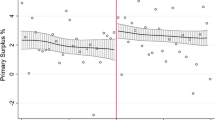Abstract
This paper shows that compromise between different ideologicalmotivations within multiparty governments may result in a biastoward running budget deficits even if all parties in thecoalition prefer balanced budgets. The deficit bias increases withthe degree of ``polarization'' of the ideological motivations andgenerally decreases with the degree of concentration of powerwithin the government. Although the analysis is conducted assuminga proportional representation electoral system, the results willalso apply to majoritarian systems if the winning party comprisesideologically different constituencies. The relationship betweenbudget deficits and multiparty governments is investigated usingdata from a sample of eight European Union countries for the period1971–1990. Analysis on pooled data is partly in line with the theory.Time series within country analysis is less favorable: we findclear support to the theory only in the case of Italy.
Similar content being viewed by others
References
Alesina, A. (1988). Credibility and policy convergence in a two-party system with rational voters. American Economic Review 78: 796-805.
Alesina, A. and Drazen, A. (1991). Why are stabilization delayed? American Economic Review 82: 1170-1188.
Alesina, A. and Perotti, R. (1995). The polical economy of budget deficits. IMF Staff Papers 42: 1-31.
Alt, J.E. and Lowry, R.C. (1994). Divided government and budget deficits: Evidence from the States. American Political Science Review 88: 811-828.
Austen-Smith, D. and Banks, J. (1988). Elections, coalitions, and legislative outcomes. American Political Science Review 82: 405-422.
Barro, R.J. (1979). On the determination of the public debt. Journal of Political Economy 87: 940-971.
Barro, R.J. (1991). Comments on McCubbins. In Alesina A. and Carliner, G. (Eds.), Politics and economics in the eighties. Chicago: University of Chicago Press and National Bureau of Economic Research.
Buti M., Franco D. and Hongena H. (1997). Budgetary policies during recessions: Retrospective application of the Stability and Growth Pact to the post-war period. Economic Papers-European Commission, n. 121.
Drazen, A. and Grilli, V. (1993). The benefits of crises for economic reforms. American Economic Review 83: 598-607.
European Commission (1998). General government data. Bruxelles.
Grilli, V., Masciandaro, D. and Tabellini, G. (1991). Political and monetary institutions and public financial policies in the industrial countries. Economic Policy 13: 341-392.
Grossman, G. and Helpman, E. (1996). Electoral competition and policy compromise. Mimeo.
Lucas, R.E. and Stokey, N.L. (1983). Optimal fiscal and monetary policy in an economy without capital. Journal of Monetary Economics 12: 55-93.
McCubbins, M. (1991). Party governance and US budget deficits: Divided government and fiscal stalemate. In Alesina A. and Carliner, G. (Eds.). Politics and economics in the eighties. Chicago: University of Chicago Press and National Bureau of Economic Research.
Poterba, J.M. (1994). State responses to fiscal crises: The effects of budgetary institutions and politics. Journal of Political Economy 102: 799-821.
Roubini, N. and Sachs, J.D. (1989a). Political and economic determinants of budget deficits in the industrial democracies. European Economic Review 33: 903-938.
Roubini, N. and Sachs, J.D. (1989b). Government spending and budget deficits in the industrialized countries. Economic Policy 8: 99-132.
Woldendorp, J., Keman, H. and Budge, I. (1993). Political data 1945-1990, party government in 20 democracies. European Journal of Political Research 24: 1.
Author information
Authors and Affiliations
Rights and permissions
About this article
Cite this article
Balassone, F., Giordano, R. Budget Deficits and Coalition Governments. Public Choice 106, 327–349 (2001). https://doi.org/10.1023/A:1005187827895
Issue Date:
DOI: https://doi.org/10.1023/A:1005187827895




